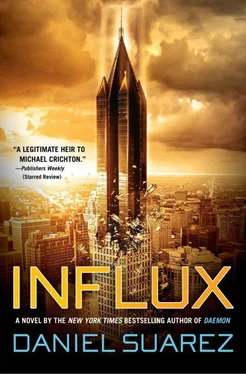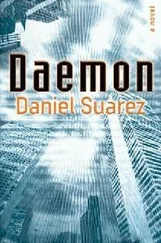Those years were his happiest childhood memories. Visiting Great Smoky Mountains National Park, Yellowstone, Yosemite, Glacier, and more; soaking in the natural world as they roughed it; backpacking through the wilderness. The more he saw, the more comfort he took in the natural world. Observing the stars in Tuolumne Meadows. Traversing the Chinese Wall in Montana or the gorges of the Canadian Rockies. Stringing bear bags at night with his father and staring up at the stars in the deep darkness of arboreal forests. He’d never felt so much at peace, watching the majesty of the physical laws that governed the cosmos arrayed above him. It was all there before his eyes.
It was in that remote wilderness that Grady began to formulate his concept of the universe and its structure. By age thirteen he began reading widely in physics—which drew him to brilliant minds like Heisenberg, Schrödinger, Feynman, Einstein, Maxwell, and especially Faraday. For the first time he felt a connection with other minds. The fact that Faraday had little formal training yet discovered the magnetic field through his intuitive lab observations inspired Grady to pursue his passion for inquiry into the natural world.
Eventually, as Grady reached college age, his parents again settled down and took teaching positions. They encouraged Grady to pursue an education, short on money though they now were.
Never a joiner and with scant academic records, Grady was nonetheless accepted to the State University of New York at Albany as a physics major. Yet he quickly grew frustrated at the survey-level courses taught not by professors but by harried graduate student teaching assistants. Grady’s impatience with others undermined him socially—as it always had.
By the time Grady dropped out of SUNY, he’d become deeply interested in the work of Bertrand Alcot, the head of Columbia University’s physics department. Alcot focused on hydrodynamics—a branch of physics that deals with the motion of fluids and the forces acting on solids immersed in fluids. Grady directed a flurry of unsolicited and unanswered emails to Alcot, making outrageously ambitious assertions, always including mathematical proofs (flawed as they later turned out to be).
Then one day he got an answer.
A year and a half after he’d starting sending his messages, while working as a mathematics tutor, Grady received a reply with a simple correction to one of his equations. As he studied Alcot’s change, Grady realized the revision was a more succinct solution—and one that gave him new ideas.
And so they continued, communicating mostly in mathematics—beginning a chess game whose pieces were the elemental forces of the natural world.
Grady’s reverie was disturbed by a gust of wind. The smell of the sea brought him back to his new reality and surroundings. The tiny island that was his prison.
He remembered the deep wilderness of North America as unspoiled by light pollution, but the night sky here had a clarity unlike anything he’d experienced. In this pristine world even satellites were readily visible, pinpoints of reflected sunlight racing through the firmament. At first he’d mistaken them for aircraft, raising hopes of signaling for rescue. But no, these moved too fast and lacked navigation lights. As days and weeks passed, it was clear no aircraft—nor indeed any ship—ever crossed the horizon. He was far from the air and shipping lanes.
Grady had examined the constellations overhead, trying to derive his position on the globe. Normally he’d locate the North Star and use it to judge his latitude with an outstretched hand—its position above the horizon would roughly correspond with his own latitude in the Northern Hemisphere. But the polestar was nowhere to be seen. The Southern Cross in the Crux constellation was clearly visible, though—which meant he was somewhere in the Southern Hemisphere, and that made his location more difficult to divine. There was no comparable polestar in the global south. Calculating latitude here involved tracking the movements of the top and bottom stars of the Southern Cross as they crossed the meridian—or something like that. He couldn’t recall precisely.
And longitude? Forget longitude. He’d have to have his starting point and record the passage of time and velocity. But he’d been brought here in the delta-wave-induced sleep the BTC was so fond of. He simply awoke in his neat stone cottage at the edge of a cliff overlooking the boundless blue.
A garden, low stone walls, and a circuitous path comprised his new world. Early on he’d traversed the entire island, looking for a way down to the water’s edge, but even though he’d walked every yard of the mile-wide landscape, it was ringed with towering cliffs. No trees dotted the terrain either, just hardy windblown shrubs and grasses. His fireplace was fueled by peat, which appeared mysteriously every time he returned from his morning walks. So, too, did his food, water, milk, and wine. He’d tried to catch his provisioners in the act. No luck. They were like gnomes. For all he knew they were gnomes; no doubt mythical creatures were within the biotech capabilities of the BTC.
Grady pondered a pale crescent moon in the midday sky. Even this ghostly white apparition was sharply detailed. Everything was pristine out here. The only intrusion was the occasional detritus from the modern world washed in among the rocks below. Plastic barrels, shipping pallets, or on one occasion a section of advertising billboard with French writing on it. He had a pair of binoculars that he used to scan the horizon, hoping to signal some ship to rescue him from his Elba-like exile. But his captors probably left the binoculars so he could know how utterly hopeless his chance of rescue was.
Grady closed his scratchy wool jacket against the wind. It was coarse with wooden buttons, and he had soft leather boots that laced high up his calves. Canvas pants and tunic. He looked like some sourdough islander, living rough off the land. In the past few months his long hair and beard had grown even longer.
The irony.
A high-tech despotic organization had exiled him not only from society but also from modernity itself. And from all social contact. So that his mind wouldn’t “poison” the world.
The chill wind picked up, so Grady headed back to the distant cottage and its inviting column of peat smoke. He picked his way carefully along the cliff-side path, listening to the terns squeal overhead. More than once he’d contemplated leaping from these heights, but depressed as he was, he still couldn’t bring himself to end his life. Depressed, yes. But not yet without hope. Not yet. And in some ways this solitude was a childhood friend.
Before long Grady pulled open the thick plank door of his cottage and entered the warmth of the space inside. One room, but spacious enough for a kitchen, with a wood stove, a table, pots, pans, a writing desk, a large feather bed, and a toilet that drained out to the cliffs below through a channel. It was a simple existence, but the months had brought about a change in him. As horrible as things were, those problems seemed strangely over the horizon. His captivity, the revelations that the BTC covered up advanced technologies, that his own gravity research, his life’s work, had been stolen by them—all these seemed like worries that could only restart once he got off this island prison. Until then, he tried to keep his mind busy on more positive concerns—like devising a means of escape.
So far it didn’t look good. Even if he could fashion a raft from the materials in his cottage, how would he reach the water? Even if he reached the water, a group as technologically advanced as the BTC would probably detect him immediately. No hiding out in the open sea. They were no doubt scanning every inch of it with sensors.
Читать дальше












